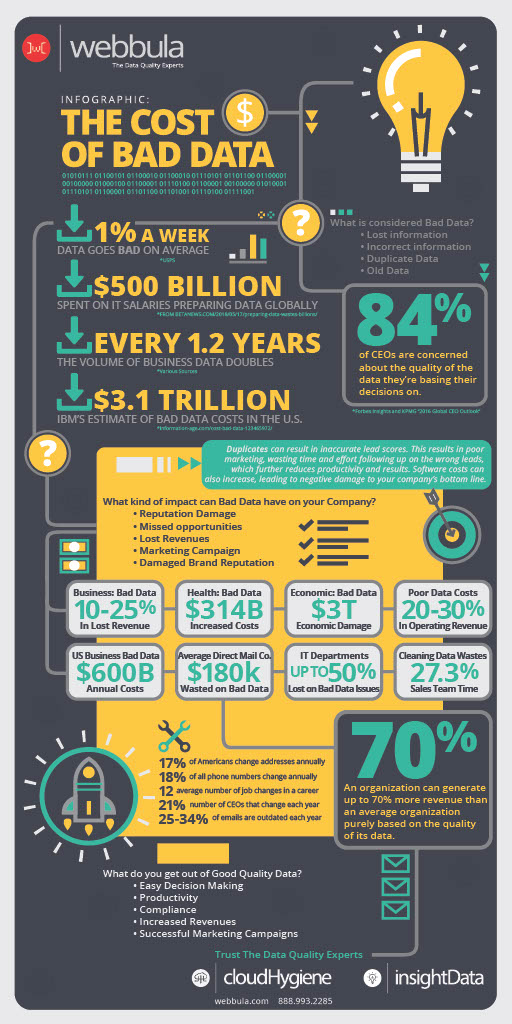What is CRM data integrity and why does it matter?
Data integrity is defined by database.guide as the accuracy and consistency of data. As the Data Solutions Experts, we’d add that data completeness is also a critical part of data integrity.
If the data in your CRM falls short on any of these fronts, you’re losing revenue and missing opportunities to boost ROI on your sales and marketing campaigns.
Need a little extra convincing?
“Bad data” defined: lost data, incomplete data, duplicate data, incorrect data, or old data.
The cost of bad data:
- According to Kissmetrics, “Businesses lose as much as 20% of revenue due to poor data quality.”
- According to Gartner Research, “the average financial impact of poor data quality on organizations is $9.7 million per year.”
How common is bad data?
- 17% of Americans change addresses annually
- 18% of all phone numbers change annually
- 21% of CEOs change each year
- 25-34% of email addresses are outdated each year
So. The real question is, what can you do about it? Here are a few pointers.
How to maintain CRM integrity?
1. Organize and Consolidate Existing Data
Get a grip on your data organization. You can do this by answering a few questions about your data management practices.
- Are you using standardized practices for data entry into your CRM?
- Do you have a centralized data hub? (Ideally, your CRM should operate like this for your company.)
- Is everyone following the practice consistently?
- Do you have written documentation outlining the process and procedure for data entry?
- Do you consistently have mission-critical data fields populated on each customer record?
Start here. If you can’t answer “yes” to all of these questions, you’ve got some work to do before moving on.
2. Evaluate Existing Data
Once you’ve got a straightforward, documented process that you’ve trained your customer service and sales teams on, you’re ready to evaluate the data housed in your CRM. Take inventory of the PII (personal identifying information) you have collected for each record.
- What data points do you have on hand?
- First name, last name, email, phone number, company information?
- What data do you need for basic operations?
- Email address, first name, last name?
- What data points are you missing that could be game-changers for marketing and sales efforts?
- For example, have you considered the value of postal addresses, age, or demographic data, like household income? If you haven’t, the possibilities are pretty endless. Explore them in our Complete Guide to Data Appends.
3. Enrich Your Database
After identifying incomplete data, whether mission-critical or nice-to-have, you can use a third-party data enrichment service, such as Webbula’s Data Enhancement, to fill in the missing customer data pieces in your CRM database.
Fill in crucial pieces like postal addresses and phone numbers. Most importantly, Webbula’s Email Hygiene service verifies an email address is valid and safe and provides insight on how active that email address is. Our Data Enhancement service can append the most current email address where email data is unknown or invalid.
Additionally, customer experience and personalization are the future of marketing. Imagine how powerful a demographic append like household income, presence of children, pet ownership, car ownership, and more could be to improve audience segmentation and messaging.
4. Clean Your Database
You’ve organized, evaluated, and filled your data gaps. What’s next?
Those email addresses in your database?
- If you don’t know where they came from,
- if you haven’t practiced regular email verification,
- and if you’ve practiced regular email verification but not hygiene, listen up.
Chances are very high that you’ve got some threats to your email deliverability hiding in that list, like bots, disposable domains, and high-risk email addresses.
Even if you’re doing everything right in your email acquisition practices, you could still have threats like honeypots and spam traps hiding in your list.
So, how do you know which emails in your CRM are a threat to your email deliverability?
A data hygiene service can help you with data cleansing and ensure you have the most accurate and up-to-date information for your customers and prospects. Webbula’s industry-leading Email Hygiene runs your data through 46 filters, checking if your email data is valid, complete, and clean.
Webbula Email Hygiene flags email addresses that could cause damage to your email sender reputation and deliverability.
5. Create a Process for Ongoing Practice
Incorporate regular data enrichment and hygiene into your data organization and consolidation practices and documentation. When it’s a trained and documented practice, you are more likely to maintain a high level of CRM data integrity.
6. Consider Adding a Lead Validation API to Your WebForms
Take a final extra measure to protect your CRM data integrity at the point of entry. With a lead validation API that checks the syntax of data like email and postal, you’ll eliminate bot attacks and human entry errors on your lead forms, setting a data quality standard from the outset.
Note: It won’t prevent disposable domains or other active threats from entering your database, making an email hygiene service still necessary, but it WILL eliminate typos and invalid bot entries, such as “kjkhugsdfjh.”
Maintaining CRM Data Integrity is All About the Right Processes and Tools
Putting the right processes and tools in place is essential for maintaining CRM data integrity within your CRM system. Make data quality a priority and engage your data team in ongoing training.

Melissa McGaughey, Director of Marketing at Webbula
Melissa McGaughey is an SEO Strategist and Inbound Content Marketer with a decade of experience in B2B spaces, including retail, restaurant, manufacturing, and payments. With a background in Agile Scrum methodology, developing processes and systems to streamline workflows, enhance productivity, and drive ROI is her jam.
Webbula is the undisputed industry leader in Email Hygiene, Data Enhancement, and Audience Targeting services. For over twelve years, customers have trusted Webbula to help them overcome complex data challenges. Proudly headquartered in Pittsburgh, PA, truth in data is at the heart of everything Webbula stands for and will always be Webbula’s passion.





